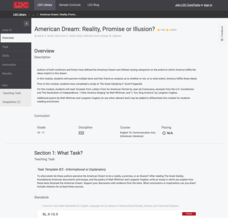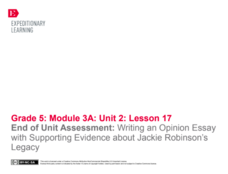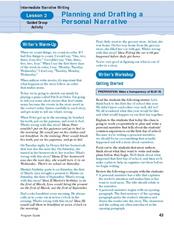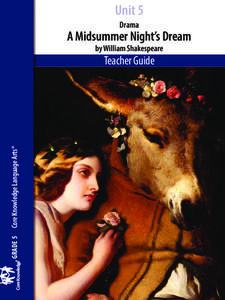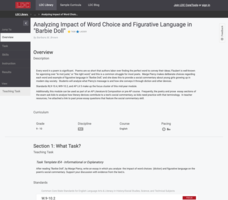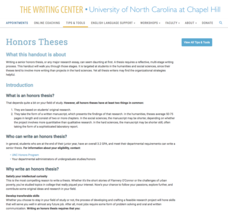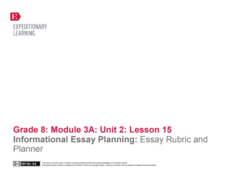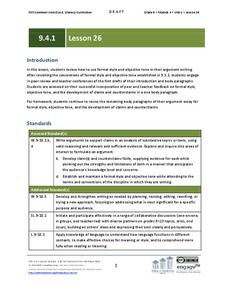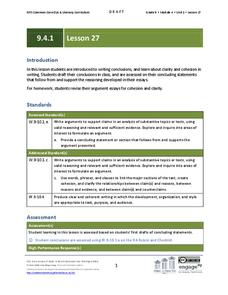Scholastic
My Favorite Activity (Grades K-2)
Scholars discuss the many ways they use persuasion in their everyday lives and brainstorm specific ideas for encouraging someone to do something. With the list of persuasive techniques they made, young writers complete a graphic...
Curated OER
Man's Search For Meaning: Writing Assessment (Final Multi-Genre Project)
Conclude a study of Viktor Frankl's Man's Search for Meaning with a research project that asks readers to investigate what various religions and philosophies believe is the meaning of life. The resource packet includes a list of...
Literacy Design Collaborative
American Dream: Reality, Promise or Illusion?
Dream or nightmare? Class members craft a synthesis essay with textual to determine to what extent the United States has fulfilled the ideas embodied in the America Dream.
University of North Carolina
Audience
Challenging pupils' perspectives by having them walk in the shoes of the reader. An informative resource discusses how to identify an audience and anticipate their needs before writing an upcoming argumentative essay.
EngageNY
Analyzing the Model Essay: Studying Argument (Chapter 27 Plus Synthesis of Scenes in Previous Chapters)
Scholars partner up to review a model essay and talk through the process leading up to writing their essays. During a second reading of the essay, learners locate and underline the claim given, reasons, and counterclaim. They then...
Maryland Department of Education
The Concept of Identity Lesson 7: Logical Fallacies
What are the effects of competition in an academic environment? The competition between the main characters in A Separate Peace motivates a series of activities that asks readers to take a stance on competition, and then to develop a...
EngageNY
End of Unit Assessment: Writing an Opinion Essay with Supporting Evidence about Jackie Robinson’s Legacy
Learners complete the end of unit assessment by writing an opinion essay about how Jackie Robinson changed America. They use evidence from the text, Promises to Keep, to support their opinions.
Center for History Education
Where Did Thomas Jefferson Stand on the Issue of Slavery?
Thomas Jefferson was a complicated man with a complex legacy. Middle schoolers examine a series of primary source documents to gather evidence for an essay in which they answer where Jefferson stood on the issue of slavery.
Curated OER
Planning and Drafting a Personal Narrative
Bring your learners together to write a class narrative about the first day of school. Start off by teaching them about sequence with a quick oral activity. Then, work together to fill out a story map. Finally, compose the class...
Core Knowledge Foundation
Unit 5: A Midsummer Night’s Dream
Fifth graders analyze William Shakespeare's A Midsummer Night's Dream, paying close attention to character development, plot, and dialogue. With daily reading and thoughtful discussion, scholars take pen to paper to respond to journal...
EngageNY
Introducing the Research Project: Asking the Right Questions
Road trip! Scholars take a look at a researcher's roadmap as they begin discussing the research process. They view the research performance task portion about Pygmalion, and then hunt for research process cards hidden under chairs. After...
Literacy Design Collaborative
Analyzing Impact of Word Choice and Figurative Language in "Barbie Doll"
After a close reading Marge Piercy's poem "Barbie Doll," class members craft an AP®-style explanatory essay in which they analyze the diction and other figurative literary devices the poet employs to deliver her commentary on modern...
Nancy Fetzer's Literacy Connections
Expository Paragraph
Upper elementary and middle school writers learn how to craft an expository paragraph by following the six steps detailed in a 48-page instructional guide. Learners learn how to write six different types of informational paragraphs: to...
University of North Carolina
Honors Theses
For those enrolled in a college honors program, four years of hard work culminate in one paper—an honors thesis. A handout outlines the steps to writing the paper, beginning with a sample timetable and time management instructions. Once...
University of Delaware
Constructing Text-Based Arguments About Social Issues
Eighth graders take a stand on a variety of controversial topics with a lesson on argumentative writing. As they view an informative presentation and work with collaborative groups, they decide which side of each argument they want to...
EngageNY
Group Discussions and Revision: Editorial Essay
Great minds think aloud! Pupils participate in the Fishbowl protocol, discussing their opinions about the Mary River mine proposal. As they share their thoughts, peers provide feedback about their thesis and supporting ideas.
Museum of Tolerance
Just What Kind of American Are You?
Your parents were both in different countries. You were born in the US. Documents and application forms ask you to identify your racial or ethnic classification. Which box do you check? Class members collect documents and application...
Curated OER
Research Paper Project
Break down some of the most foundational components of writing a research paper, such as incorporating and formatting citations, creating a thesis statement, and using quotes effectively, into manageable tasks for your young writers.
EngageNY
Informational Essay Planning: Essay Rubric and Planner
Pupils walk through the process of writing essays for their final assessment of Unbroken. They begin by reviewing the rubric using Rubric Criteria strips that assign a portion of the rubric to each pair of learners. They then participate...
EngageNY
Grade 9 ELA Module 4, Unit 1, Lesson 28
As writers continue to revise their argument essays, the focus shifts to editing grammatical conventions, parallel structure, and varying syntax to add interest. After examining model sentences that demonstrate sentence variety, writers...
EngageNY
Grade 9 ELA Module 4, Unit 1, Lesson 26
The focus of the day's instructional activity is methods for creating a formal style and objective tone in an argument essay. After examining models, pairs engage in peer review of their essay drafts and continue to revise while...
National Endowment for the Humanities
The Glass Menagerie: Impact of Expressionism
Young scholars are challenged to write a realistic analysis of Tennessee Williams' nonrealistic memory play, The Glass Menagerie. Writers use the evidence gathered on their worksheets to craft an effective thesis and concluding statement...
EngageNY
Grade 9 ELA Module 4, Unit 1, Lesson 27
Crafting a clear and cohesive conclusion to any piece of writing is crucial. An effective conclusion restates the central claim in the introduction, briefly summarizes the supporting claims, and presents a new way of thinking about the...
EngageNY
Grade 9 ELA Module 4, Unit 1, Lesson 25
After analyzing the strengths and weaknesses of the evidence they have recorded on their argument outline tool, writers draft their essay's first body paragraphs, ensuring they have properly cited their source material.




